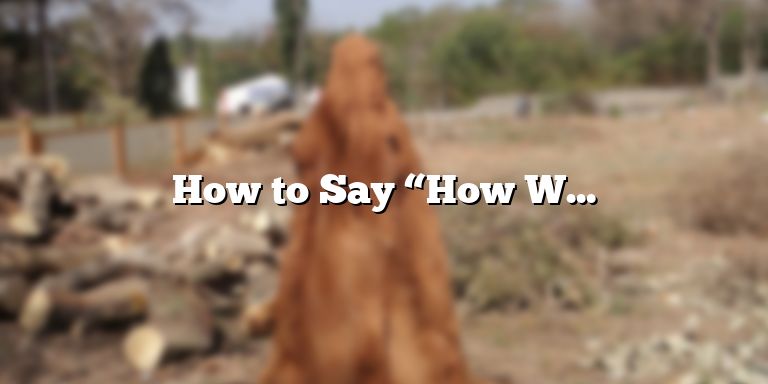
Why is it important to know how to ask “How was your day?” in Spanish?
Knowing commonly used phrases in Spanish helps individuals to communicate effectively with Spanish-speaking counterparts and also opens up opportunities for personal and professional growth. Using phrases like “How was your day?” not only demonstrates concern for another person’s well-being but also builds rapport and helps to form relationships with others.
Spanish is one of the most widely spoken languages globally, with over 580 million native speakers. Knowing how to ask “How was your day?” in Spanish presents an opportunity to engage with the Spanish-speaking community and gain cultural understanding. It could also provide a competitive advantage in career advancement, as access to Spanish-speaking clients and colleagues expands business opportunities globally.
With these benefits in mind, it’s a great idea to learn how to ask “How was your day?” in Spanish.
Formal vs. Informal
In Spanish, there are two ways of saying “how was your day” depending on the formality of the situation. If you’re speaking with someone you’re on formal terms with, you can use the phrase “¿Cómo estuvo su día?”
The verb “estar” is conjugated in the third person singular, “estuvo,” which is the past tense of “estar.” In this case, “estuvo” means “was.” Using the polite pronoun “su” instead of “tu” in front of “día” indicates respect for the person you’re speaking to.
On the other hand, if you’re speaking with someone you’re on casual terms with, you can use the phrase “¿Cómo estuvo tu día?”
The verb “estar” is conjugated in the second person singular, “estuvo,” which is the past tense of “estar.” In this case, “estuvo” means “was.” Using the casual pronoun “tu” instead of “su” in front of “día” allows for a more informal conversation between friends or family members.
It’s important to note that using the wrong form of address can come across as rude or unprofessional. Make sure to pay attention to the level of formality in any given situation before choosing which phrase to use.
Overall, knowing how to say “how was your day” in Spanish can help you connect with Spanish speakers and make your conversations more meaningful. By taking the time to understand the level of formality in each situation, you can make sure to use the correct expression and build stronger relationships with those around you.
Common Phrases
When you want to ask someone how their day went in Spanish, there are a few commonly used phrases that you can use. The most common ones are “¿Cómo estuvo tu día?” and “¿Qué tal estuvo tu día?” These phrases are both informal and can be used to greet friends or acquaintances.
“¿Cómo estuvo tu día?” literally translates to “How was your day?” and is the most straightforward way to ask about someone’s day. You can also use this phrase to ask someone how their week, weekend, or any other period of time was.
Another common way to ask about someone’s day is “¿Qué tal estuvo tu día?” This phrase is more informal than “¿Cómo estuvo tu día?” and is a common way of asking how someone is doing in general. It literally translates to “How was your day?” or “How’s it going?”
Adding Emphasis
If you want to add more emphasis to your question, you can use the word “tan” to ask “¿Qué tan bien estuvo tu día?” This phrase translates to “How well did your day go?” and is a more specific way of asking about the quality of someone’s day.
Alternatively, you can use the phrase “¿Cómo te fue?” which translates to “How did it go for you?” This phrase is commonly used in Latin America and Spain to ask how someone’s day went, as well as other events such as exams, interviews, or dates.
Other Phrases to Use
There are many other phrases that you might hear or use when asking someone about their day in Spanish. For example, you could ask “¿Cómo fue tu día en el trabajo/escuela?” which translates to “How was your day at work/school?”
If you want to show that you care about how the person is feeling, you could use the phrase “¿Cómo te encuentras hoy?” or “¿Cómo te sientes hoy?” These phrases translate to “How are you feeling today?” and show that you are concerned about the person’s emotional state as well as their day.
Conclusion
Asking about someone’s day is a great way to start a conversation and connect with people. Whether you use the common phrases “¿Cómo estuvo tu día?” and “¿Qué tal estuvo tu día?” or one of the more specific phrases like “¿Cómo fue tu día en el trabajo/escuela?” or “¿Cómo te encuentras hoy?” it’s important to show that you care about the person’s well-being. By using these phrases, you can not only practice your Spanish skills but also make new friends and strengthen existing relationships.
Expanded Responses
Learning how to say “how was your day” in Spanish is a great starting point for holding basic conversations with native Spanish speakers. However, if you want to take your conversations to the next level, it’s essential to practice expanded responses. These responses allow you to provide more details about your day and show your conversation partner that you are interested in continuing the conversation.
An excellent response you can use is “mi día estuvo bien gracias.” which translates to “my day was good, thank you.” This response is simple, friendly, and sets a positive tone for the conversation. Make sure to use a friendly tone of voice when saying this to make your response more welcoming.
If you had a particularly busy day, you can say “tuve un día bastante ocupado” which translates to “I had a pretty busy day.” This response shows that you had a lot going on and gives you an opportunity to discuss the details of your day further. Consider mentioning some of the tasks or activities you were busy with to keep the conversation going.
Another response you can use when talking about your day is “tuve un día tranquilo” which means “I had a quiet day.” This response is great when you didn’t have much happening during the day or want to shift the focus of the conversation to something else. You can follow up with a question like “¿Y tú cómo estuvo tu día?” which means “And how about your day?” to keep the conversation going.
It’s essential to practice these expanded responses to make your conversation flow naturally. Try to use them in everyday situations, and soon you’ll notice that your Spanish communication skills will improve significantly. Learning a few Spanish phrases and practicing them frequently can make a significant difference in your ability to communicate and build rapport with Spanish speakers.
Remember, the key to mastering any language is consistent practice. Keep practicing, use these expanded responses, and soon you’ll be having full-fledged conversations with native Spanish speakers with ease and confidence!
Alternative Phrases
When we want to catch up with our family or friends, we often ask, “How was your day?” In Spanish, this phrase is translated as “¿cómo fue tu día?” It is a great conversation starter, but sometimes, it’s nice to switch things up with alternative phrases. Here are some phrases you can use to ask about someone’s day in Spanish.
1. ¿Cómo te fue hoy?
This phrase translates to “How was your day today?” It is a common way to check in with someone about their day and see how their day went.
2. ¿Cómo lo pasaste hoy?
This phrase is a bit more specific because it asks how the person spent their day. It is a great way to start a conversation and learn more about what the person did throughout the day.
3. ¿Qué hiciste hoy?
Translated to “What did you do today?” this phrase is a bit more direct and can lead to a more detailed conversation about the person’s day. It is a great way to learn more about their daily routine and any activities they participated in.
4. ¿Cómo te ha ido el día?
Translated to “How has your day been?”, this phrase is a bit more formal. It is great to use with co-workers or someone you may not know too well.
5. ¿Cuéntame sobre tu día?
This phrase means “Tell me about your day?” This specific question is more open-ended and can lead to a more extended conversation about the person’s day. It’s a great way to learn more about their life and any exciting developments that occurred.
Switching up your conversation with alternative phrases is a great way to learn more about the people in your life. These phrases can open up discussions that allow you to connect with people better. Don’t be afraid to try out some of these phrases and see where the conversation goes.






